By STEPHEN M. LEPORE FOR DAILYMAIL.COM
Published: | Updated:
Canada Prime Minister Mark Carney warned that Donald Trump is ‘trying to break us so that America can own us’ in his victory speech after his Liberals won the federal election Monday.
The Liberal Party is projected to continue to rule Canada after being declared winner of Monday’s elections, though it is unclear if it will be a minority or majority government.
In a speech in Ottawa in the late hours after his victory was secured, he took dead aim at Trump with a dark premonition, claiming to be preparing ‘for the worst.’
‘As I’ve been warning for months, America wants our land, our water, our resources, our country… never,’ he promised.
Carney said these were not ‘idle threats,’ adding: ‘President Trump is trying to break us so that America can own us.’
‘That will never, ever happen. But we also must recognize the reality that our world has fundamentally changed,’ he said to applause.
Carney promised, still, to meet with Trump despite ‘a crisis that we did not create’ and promised to ‘win this trade war with America.’
‘When I sit down with President Trump, it will be to discuss the future economic and strategic relationship between two sovereign nations and it will be with full knowledge that we have many other options to build prosperity for all Canadians.’

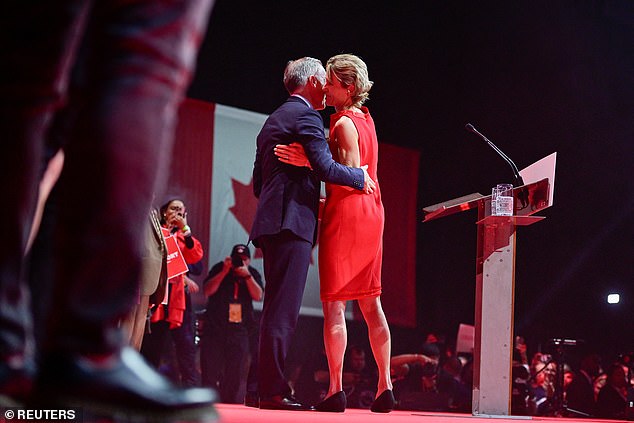
However, he warned: ‘Our old relationship of integration with the U.S. is now over. These are tragedies but it’s also our new reality. We are over the shock of the American betrayal, we have to take care of each other.’
‘We will strengthen our relationship with reliable partners in Europe and Asia and elsewhere in the world and if the U.S. Doesn’t want to play a pivotal in the world economy, we will lead, not the Americans.’
Trump has yet to weigh in on the result. DailyMail.com has reached out to the White House for comment.
The Liberals completed a shocking comeback driven by anger toward Trump, though its too soon to say whether they will be forming a majority or minority government in Canada’s parliamentary system.
Canada’s system requires either a majority of 172 parliamentary seats or a coalition government between one of the two major parties – the Liberals and Conservatives – and one of a few smaller parties.
Prognosticators have said its too soon to tell if Carney’s Liberals will have more than 172 seats but they would be likely to form a coalition with the far left New Democrat Party.
As of 2 a.m. EDT, Liberals were leading in or won in 167 of 343 districts (up from 150 in the previous government), with Conservatives leading in 145.
Bloc Quebecois leads in 23 (down from 33), while the NDP leads in seven (down from 24) and the Green Party in one (unchanged), according to CBC.
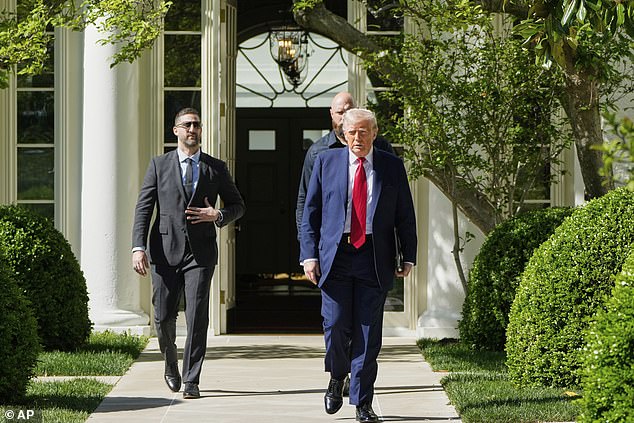
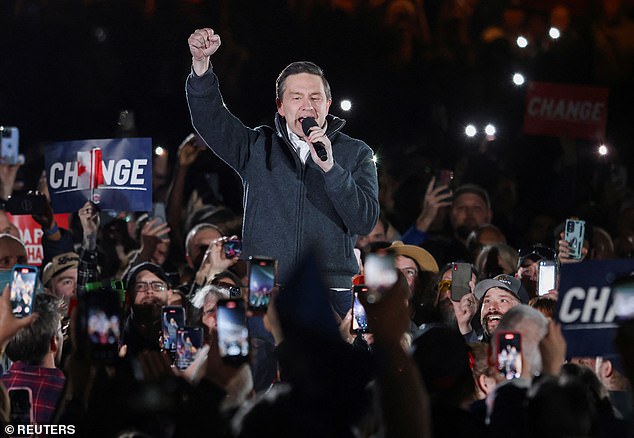
It means that Carney will remain in charge of dealing with an American president in Trump who has openly gloated about making the neighbors to the north the ’51st state’ and calling his predecessor ‘Governor [Justin] Trudeau.’
The U.S. president trolled Canadians on election day by suggesting on social media that he was in fact on the ballot and repeating that Canada should become the 51st state, incorrectly claiming the U.S. subsidizes Canada.
‘It makes no sense unless Canada is a State!’ Trump wrote.
Trump reinserted also made mention of the election during a signing ceremony inside the Oval Office earlier Monday, saying Canada ‘would cease to exist as a country’ if the U.S. stopped buying its goods.
‘I have to be honest, as a state, it works great,’ said Trump, who previously threatened to make the country the 51st state through economic coercion.
Trump reiterated his claim that the U.S. doesn´t need anything from Canada – including autos and oil.
The Liberals looked headed for a crushing defeat until the American president started attacking Canada´s economy and threatening its sovereignty.
Trump´s actions infuriated Canadians and stoked a surge in nationalism that helped the Liberals flip the election narrative and win a fourth-straight term in power. Some have chosen to cancel U.S. vacations, refuse to buy American goods and possibly even vote early.
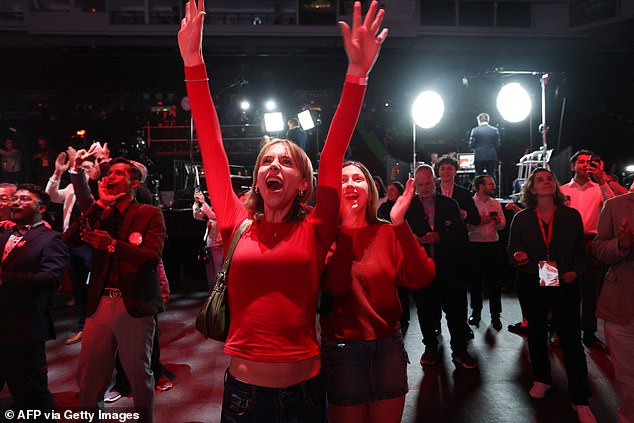
![Carney will remain in charge of dealing with an American president in Donald Trump (pictured right) who has openly gloated about making the neighbors to the north the '51st state' and calling his predecessor 'Governor [Justin] Trudeau' (pictured left)](https://the-carrington.com/wp-content/uploads/2025/04/97802849-14657373-image-a-19_1745893198774.jpg)
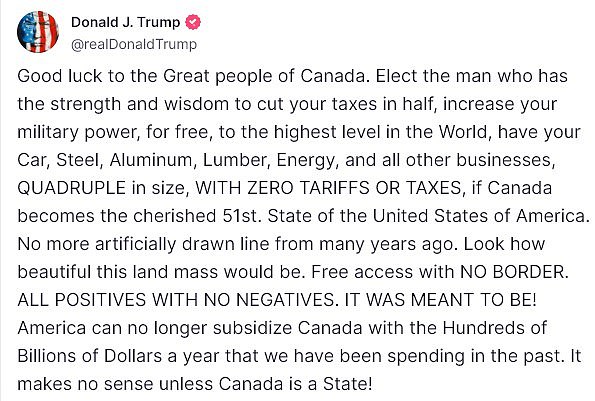
The opposition Conservative Party´s leader, Pierre Poilievre, hoped to make the election a referendum on former Prime Minister Justin Trudeau, whose popularity declined toward the end of his decade in power as food and housing prices rose.
But Trump attacked, Trudeau resigned and Carney, a two-time central banker, became the Liberal Party´s leader and prime minister.
The president bragged about his effect on the Canadian election and how he’d hurt Poilievre in an interview with The Atlantic published Monday.
‘You know, until I came along, remember that the conservative was leading by 25 points,’ Trump said.
‘Then I was disliked by enough of the Canadians that I’ve thrown the election into a close call, right? I don’t even know if it’s a close call,’ he added.
Poilievre conceded defeat to Carney’s Liberals and said his party would hold the government to account. If the Conservative Party won all 146 districts its currently leading, that would still mark an increase of 26 seats from the previous government.
In a speech conceding defeat and with his own seat in the House of Commons still in doubt, Poilievre vowed to keep fighting for Canadians and their right to an affordable home on a safe street.
‘We are cognizant of the fact that we didn’t get over the finish line yet,’ Poilievre told his supporters in Ottawa.
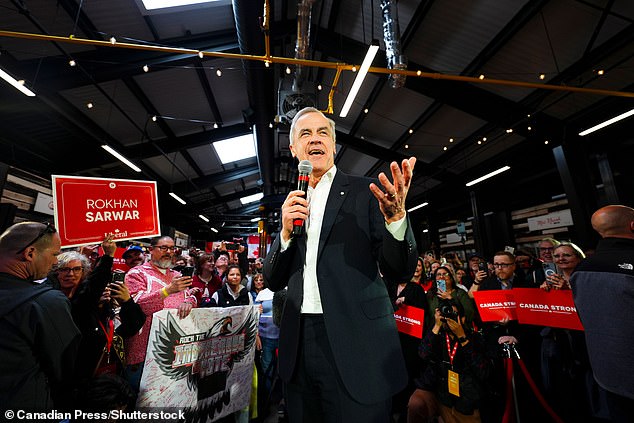
‘We know that change is needed, but change is hard to come by. It takes time. It takes work. And that’s why we have to learn the lessons of tonight – so that we can have an even better result the next time Canadians decide the future of the country.’
Carney had asked for a strong mandate to help him handle Trump’s tariffs and annexation threat but CBC said the Liberals had not yet secured the 172 electoral districts, known as seats, they needed for a majority.
Poilievre was considered the frontrunner consistent with the rise in anti-incumbent party sentiment at the start of the year. Trudeau and his Liberal Party had been in power for nearly a decade.
The Conservative leader had run on a MAGA-style platform, promising tax cuts, complaining about immigration and dipping his toe into culture war issues.
The full result might not be known for some time and could depend on the westernmost province of British Columbia, where polls closed last.
The last party to win four consecutive elections in Canada was the Liberals, in 2004.
Carney and the Liberals cleared a big hurdle by winning a fourth-straight term, but they have daunting challenges ahead.
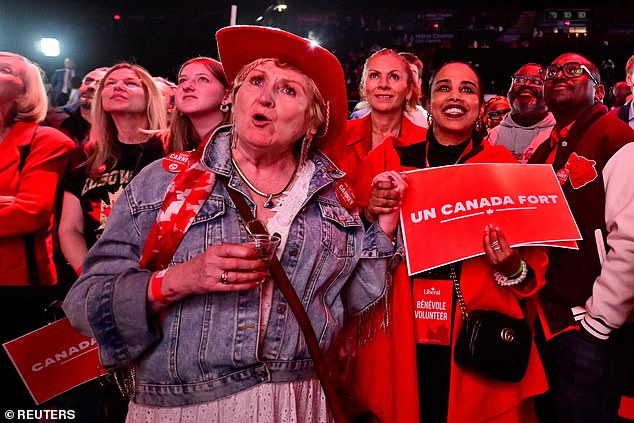
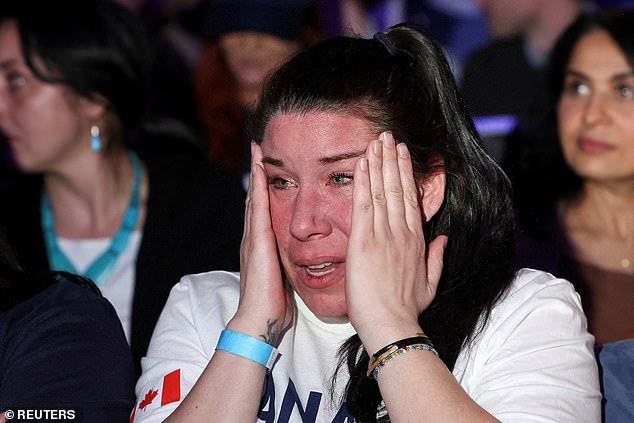
Foreign policy hadn´t dominated a Canadian election as much as it did this year’s since 1988, when, ironically, free trade with the United States was the prevailing issue.
In addition to the trade war with the U.S. and frosty relationship with Trump, Canada is dealing with a cost-of-living crisis.
And more than 75% of its exports go to the U.S., so Trump’s tariffs threat and his desire to get North American automakers to move Canada’s production south could severely damage the Canadian economy.
While campaigning, Carney vowed that every dollar the the government collects from counter-tariffs on U.S. goods will go toward Canadian workers who are adversely affected by the trade war.
He also said he plans to keep dental care in place, offer a middle-class tax cut, return immigration to sustainable levels and increase funding to Canada’s public broadcaster, the Canadian Broadcasting Corporation.








